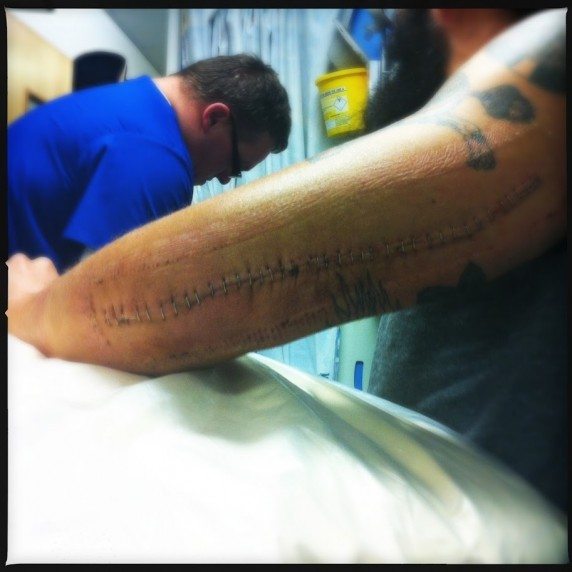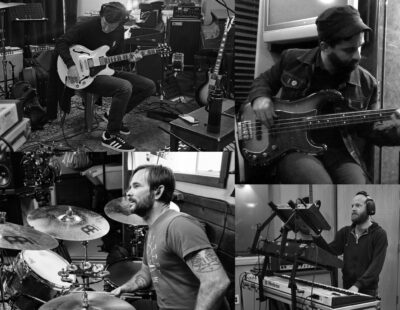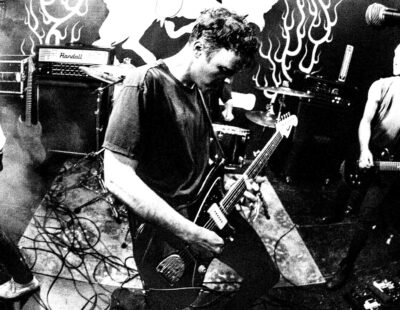Your account of the crash was harrowing, but also very eloquent. It also seemed pretty thorough. Why did you decide to talk more about it going forward?I wanted to do the statement for a couple of reasons: Most importantly, I just wanted to do it. It was helpful for me to put it out there. I think that in the week or two following the crash, the press that was happening was inconsistent with my experience. I was thorough so that I could clear up what I thought were some glaring issues or inaccuracies with what the BBC or whomever had put out there that ended up making it to the computer screens of all our fans or whatever.
Not that I even think that everybody really gives a shit about the minutiae of everything, but I figured… if I gave a fairly detailed account, it would serve the dual purpose of informing anybody who cared about what happened, and then furthermore–as we got closer to having to do press again–that so many of those questions could be referenced, and if I don’t feel like going over them again, I don’t have to. So, it’s just kind of a case of I wanted to be as clear as I could, because I was getting a lot of emails from our fans asking what was going on. It seemed to me like a lot of people didn’t understand the actual gravity of what happened. Because when I was reading it, it looked pretty cheery and that was not the experience that I had with it.
[And] that’s just to say that, we weren’t all home after a week. It didn’t resolve itself after a week. It’s gonna be something that takes the band a very long time to shake off. It’s like putting out a record: After a certain point, you don’t wanna answer the same questions over and over again. A couple people had gotten in touch with me who had been in noticeable accidents in the past, and they all warned me how long the experience was likely to dog us, as far as interviewers were concerned. So, there you go. I figured nobody’s gonna present it better than I am without an editor.
Would it be trivial to use the word “cathartic” to describe writing that account, or is it just an early step in the process?
Yeah, it’s a step in the process. To say cathartic would mean that, after I’d written it, there was a huge sigh of relief and things suddenly changed in some fundamental way, which didn’t happen. Going through the accident the way I did, which was very consciously and very lucidly, the more frequently I go through the story, the easier it becomes to tell and deal with–and hopefully to get past.
Does everyone else who was on the bus feel that way?
It’s really hard for me to say how everybody feels. We have not all reconvened on this. We’ve kept in touch; we’re in very close contact with one another. Feeling the way I do about it, I would be very hesitant to even make an estimated guess on how somebody feels about it, because I know it shook us all up in some way. So, I wouldn’t want to try to articulate somebody else’s pain or lack thereof.
I don’t know… I only know that everybody kept very positive through it. When the majority of us had been discharged from the hospital and were home, I know they still called me frequently. Everybody was checking up. We were trying to defuse some of the gravity of it just by joking around and trying to bullshit our way through some of the seriousness. It’s not like it had the power to emotionally cripple us for life. But it certainly had the potential to end one or all of our lives, and I think paying respect to that fact is the heavy thing for us. The prevailing sentiment seems to be let’s get back out on the road and continue to tour, because that’s actually gonna be the best thing for this.
It was inspiring the way you concluded the essay with the notion of acknowledging life’s “on/off” switch.
It didn’t seem to need that much trauma to reach that conclusion. In a way, I feel like I’m preaching to the choir when I say something so cliche–the whole live every moment of your life thing–but I think that it was shown to me in a new way, just for me personally. There’s a certain amount of, you’ve just gotta puff your chest out a little bit and just say, “OK man, we’re gonna get back to it.” Now it’s very easy to convince myself out of doing something. I’ve got an ace-in-the-hole excuse not to do anything. I’ve got the irrefutable way out of accomplishing anything this year, and that’s not cool. I’m not happy to have that excuse. I’d rather work my way through it back to a point where I’m held accountable for 100 percent of everything. And I’m looking forward to it.
It’s gonna be one of those hard-earned things for me. That’s the way I’m wired, and I kind of think we all see things in a similar way. It’s like, here’s this awful thing for you. It’s gonna take you a bare minimum of six months to walk out the other side of it. But why not use that as an excuse to not only evaluate where you’re going from a creative standpoint, but also creatively, professionally, just as being a person? I’d like to think this is a wake-up call in so many ways. I’m gonna use it whether or not anybody is paying attention.

John from Candiria asked us for your contact information following the crash. What did you take out of communicating from him?
He was very blunt about some of the potentialities that I’m unable to see right now because I’m stuck in the very real, physical, human part of it. He warned me about overusing painkillers. It was just that simple. Saying that can have a lengthy effect on someone. And that’s an issue I’ve struggled with my entire adult life. It’s one to which I have to be keenly sensitive and keenly aware, and I took that as a reaffirmation of how vigilant I have to be in order to get through this in as clean a way as possible. Having gone through the extent of injuries that I have, there are points that are impossible to deal with without painkillers. But the last thing I wanna say at the very end of this [experience] is that I had to use pharmaceuticals to get through. I’m trying to get myself off all pharmacological aides. I just like to feel that good sense of accomplishment that comes with hard work, and maybe a little bit of pain here and there.
Are you focusing on physical therapy right now in lieu of dealing with any PTSD issues? Do you have a choice? Do you have to confront them at the same time?
I think they’re one and the same. That’s my mindset. They bolster each other and they can be overcome together. In many ways, the physical side is the easy side. More or less, it’s just a matter of physical science. It’s like math: It’ll add up. If I put in X amount of work, I’m gonna receive Y amount of benefits. My doctors are still confident that I can regain certain things, and they’re confident that I will not regain certain things. There’s some realities that exist there that are just invariable, so…
Can you be specific about that?
Yeah, I mean, I’ll walk again. I’m already beginning to have function with my arm. I’m a pretty avid runner. I don’t know how much running I’ll do in the future. It’s a pretty serious break I’ve got in my leg. And there’s quite a bit of nerve damage in my arm. So, how that’s gonna pan out in the long run is up to anybody. Anybody but me, at least. It’s a waiting game to see… once the greater trauma dies down, then we’ll see what you’re left with. I’ve got about 90 percent feeling [in my hand]. The rest of my arm, there’s huge chunks of it that have no feeling whatsoever. I mean nothing. Nada. I can’t tell if I’m being burned or sliced or whatever. And then there’s other parts of my arm where all the nerves have been bundled together when they reconstructed it, and it’s hypersensitive, so it’s like 24 hours a day feeling like you’re being shocked.
I’ll work. I’ll work at it, and in six months… I have no doubt that within six months, we’ll be playing shows again. Just how limber and spry I am, uh… it has something to do with how well I approach the rehabilitation. But then there’s some of it that’s just “tough titty.”
I’m reminded on a daily level by all of the surgeons that there was a point within the 48 hours following the accident, before I had surgery done, that we were using words like “amputation”; the doctors assumed I wouldn’t be able to use my hand again. They had to remove all of my arm; they had to pull it all out of the skin from the forearm up to the shoulder. Then they had to break my forearm bone off because all the muscle in my upper arm was attached to it. They broke that where there was no break. They pulled all the muscles out; they moved all the nerves out of the way, pulling quite a few of them out and packing them up into my shoulder. Then they pieced the arm back together. I was told it looked way more like carpentry than surgery.
When I wake up and I can move my hand, these doctors who are typically pretty stone cold, especially in the U.K.–they’re very straightforward and they don’t like to tell you anything but the, like, least helpful thing that they’re morally obligated to. So, I came out of surgery, and they’re like doing cartwheels around the recovery room because I could move my hand; and after eight-and-a-half hours, they were pretty sure that hand wasn’t gonna do anything but, you know, dangle. If I’ve gotta be extra careful about bumping into a wall now because I’ve got no nerves in my arm, whatever. I guess I’m like Darkman now.
I was totally gonna say that. I just didn’t want to be a dick.
[Laughs] I’m like one-quarter Darkman.
[CONTINUED TOMORROW]






